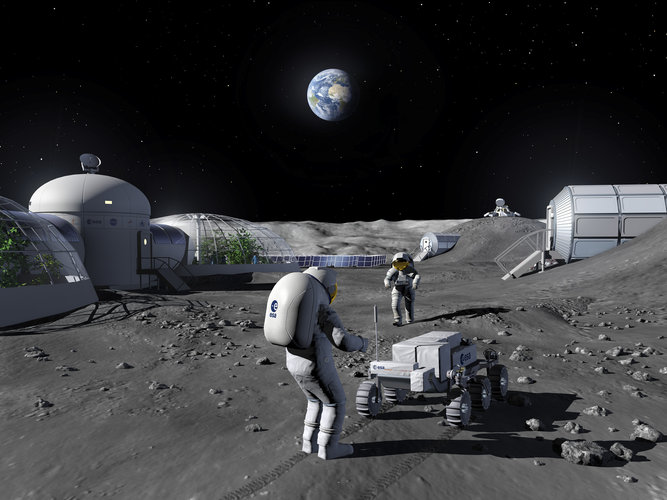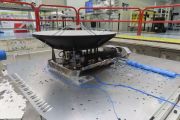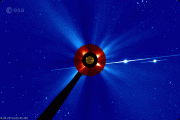
Copernical Team
HawkEye 360 awarded radio frequency contract by NRO
 HawkEye 360 Inc., the world's leading commercial provider of space-based radio frequency (RF) data and analytics, reports it has been awarded a contract from the NRO's Commercial Systems Program Office (CSPO). The contract will assess, mature, integrate, and operationalize commercial RF intelligence into the NRO's integrated overhead architecture to support warfighters, the intelligence communit
HawkEye 360 Inc., the world's leading commercial provider of space-based radio frequency (RF) data and analytics, reports it has been awarded a contract from the NRO's Commercial Systems Program Office (CSPO). The contract will assess, mature, integrate, and operationalize commercial RF intelligence into the NRO's integrated overhead architecture to support warfighters, the intelligence communit NRO awards commercial RF Capabilities Contract to Kleos Space
 Kleos Space Inc, a space-powered Radio Frequency Reconnaissance Data-as-a-Service (DaaS) and Mission-as-a-Service (MaaS) provider, has been awarded a first stage contract, from the National Reconnaissance Office (NRO) as part of the Strategic Commercial Enhancements Broad Agency Announcement (SCE BAA) Framework.
The NRO is responsible for maintaining global vigilance in times of peace and
Kleos Space Inc, a space-powered Radio Frequency Reconnaissance Data-as-a-Service (DaaS) and Mission-as-a-Service (MaaS) provider, has been awarded a first stage contract, from the National Reconnaissance Office (NRO) as part of the Strategic Commercial Enhancements Broad Agency Announcement (SCE BAA) Framework.
The NRO is responsible for maintaining global vigilance in times of peace and Juno probe takes detailed photo of Jupiter's moon, Europa
 NASA's Juno space probe captured detailed images during a close flyby of Europa, Jupiter's largest moon.
The probe came within 219 miles of the ice-covered celestial body, one of the closest approaches by any spacecraft.
The first image taken by the probe's Junocam was released Thursday. It shows the icy and rugged surface of an area close to Europa's equator, known as the Annwn
NASA's Juno space probe captured detailed images during a close flyby of Europa, Jupiter's largest moon.
The probe came within 219 miles of the ice-covered celestial body, one of the closest approaches by any spacecraft.
The first image taken by the probe's Junocam was released Thursday. It shows the icy and rugged surface of an area close to Europa's equator, known as the Annwn Firefly Aerospace scrubs launch after rocket engine shuts down
 Firefly Aerospace aborted an attempted launch Friday from Vandenberg Space Force Base in California after an unexpected engine shutdown.
An Alpha rocket was scheduled to blast off into space and perform tests in orbit, but shortly after ignition, an engine shut down, leaving the rocket on the launch pad without any ostensible damage.
"The vehicle went into auto-abort after igniti
Firefly Aerospace aborted an attempted launch Friday from Vandenberg Space Force Base in California after an unexpected engine shutdown.
An Alpha rocket was scheduled to blast off into space and perform tests in orbit, but shortly after ignition, an engine shut down, leaving the rocket on the launch pad without any ostensible damage.
"The vehicle went into auto-abort after igniti Unknown debris dislodges from Ingenuity Mars helicopter's foot during 33rd flight
 NASA said Friday that it is looking into debris that was seen on the foot of the Ingenuity helicopter's foot during its 33rd space flight on Mars.
"We're looking into a bit of debris that ended up on Ingenuity's foot during its latest aerial commute," NASA's Jet Propulsion Lab said in a statement on Twitter.
NASA shared a GIF video of the tiny helicopter's flight Friday which sho
NASA said Friday that it is looking into debris that was seen on the foot of the Ingenuity helicopter's foot during its 33rd space flight on Mars.
"We're looking into a bit of debris that ended up on Ingenuity's foot during its latest aerial commute," NASA's Jet Propulsion Lab said in a statement on Twitter.
NASA shared a GIF video of the tiny helicopter's flight Friday which sho Elon Musk may help NASA extend life for Hubble
 The U.S. space agency, NASA, said it signed an agreement with Elon Musk's SpaceX to study whether the life expectancy of the venerated Hubble Space Telescope can be extended.
NASA said Thursday it has no plans to carry out or fund a service mission for the Hubble Space Telescope. Instead, it will carry out a feasibility study to see if SpaceX can use its Crew Dragon capsules to do the h
The U.S. space agency, NASA, said it signed an agreement with Elon Musk's SpaceX to study whether the life expectancy of the venerated Hubble Space Telescope can be extended.
NASA said Thursday it has no plans to carry out or fund a service mission for the Hubble Space Telescope. Instead, it will carry out a feasibility study to see if SpaceX can use its Crew Dragon capsules to do the h Solar power beams: a step towards cleaner energy
 Beaming solar power could help Europe access more renewable energies, in an independent way. Airbus has now demonstrated how this new technological concept could work in its X-Works Innovation Factory.
Everything is illuminated, thumbs up. Jean-Dominique Coste, Yoann Thueux and their colleagues have just shown decision-makers from politics and industry the inner workings of a new energy co
Beaming solar power could help Europe access more renewable energies, in an independent way. Airbus has now demonstrated how this new technological concept could work in its X-Works Innovation Factory.
Everything is illuminated, thumbs up. Jean-Dominique Coste, Yoann Thueux and their colleagues have just shown decision-makers from politics and industry the inner workings of a new energy co Wanted: firms to connect and guide Moon missions

Are you ready to join ESA’s initiative to support European space companies to create a constellation of lunar satellites that connect and guide missions to the Moon?
Firefly Aerospace reaches orbit with new Alpha rocket
A new aerospace company reached orbit with its second rocket launch and deployed multiple small satellites on Saturday.
Firefly Aerospace's Alpha rocket lifted off from Vandenberg Space Force Base, California, in early morning darkness and arced over the Pacific.
"100% mission success," Firefly tweeted later.
A day earlier, an attempt to launch abruptly ended when the countdown reached zero. The first-stage engines ignited but the rocket automatically aborted the liftoff.
The rocket's payload included multiple small satellites designed for a variety of technology experiments and demonstrations, as well as educational purposes.
The mission, dubbed "To The Black," was the company's second demonstration flight of its entry into the market for small satellite launchers.
The first Alpha was launched from Vandenberg on Sept. 2, 2021, but did not reach orbit.
One of the four first-stage engines shut down prematurely but the rocket continued upward on three engines into the supersonic realm where it tumbled out of control.
The rocket was then intentionally destroyed by an explosive flight termination system.
Firefly Aerospace said the premature shutdown was traced to an electrical issue, but that the rocket had otherwise performed well and useful data was obtained during the nearly 2 1/2 minutes of flight.
NASA eyes November for launch attempt of Moon rocket

The US space agency, which was forced to postpone its latest liftoff attempt due to massive Hurricane Ian which hammered Florida this week, announced it was preparing its next launch window for between November 12 and November 27.
"Over the coming days," NASA said in a blog post, the team will assess conditions and necessary work and "identify a specific date for the next launch attempt."
Officials had so far refused to completely shut the door on an earlier attempt in October.
The SLS rocket, the most powerful ever designed by NASA, had to be returned to its storage hangar at Kennedy Space Center on Tuesday in order to shelter it from the approach of Hurricane Ian.
The storm devastated parts of Florida but the rocket itself suffered no damage, NASA said.
Planning efforts for the November launch window will allow "time for employees at Kennedy to address the needs of their families and homes after the storm" and in the run up to the next mission attempt.




































